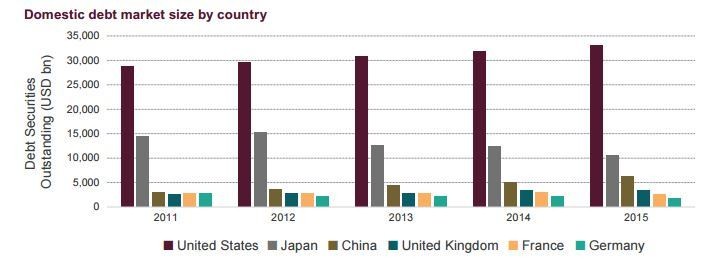By guest contributor Michael Boye from Saxo Bank
While the opening of the Chinese economy to the rest of the world and gradual embracing of market economy by the Communist superpower has been one of the most dominant and driving themes in finance this millennium, the development has been kept on a very tight leash by the still all-deciding central government in Beijing.
The Chinese bond market is no exception, slowly growing to become the world’s third-biggest behind only Japan and the US. So far, it has mainly been a closed party for the domestic banks operating in China’s inter-bank market, where about 90% of securities are issued and traded. Non-Chinese issuers with an intention to sell renminbi denominated bonds have been referred to the offshore so-called dim sum market in Hong Kong.
The onshore Chinese bond market could soon be the world’s second biggest.

Source: Bank of International settlements
Now the Chinese authorities are opening the domestic market further, as last week it issued market licences for the first time to US banks – JP Morgan and Citigroup the lucky winners – after having opened the market for the first time to foreign operators earlier last year.
The move, however well-intentioned and progressive it might seem on the outside, won’t revolutionise China’s bond markets overnight though, as state-controlled interests and long-held relationships still dominate decision-making at the corporate level.
Instead, by letting foreign banks into its local market, Beijing hopes to further boost the so-called panda bond market (and they say bankers have no creative sense) – that is improving access for non-Chinese issuers to sell bonds in China’s domestic market.
Up until now it has been a slow start for this very young market, where two issues from the Republic of Korea and Province of British Columbia respectively stood out as the lone notable breakthroughs. The process of obtaining the necessary approvals, a rigid process of disclosures and documentation with local authorities, has been blamed for halting the progress.

